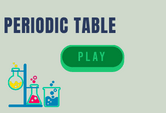Periodic Table of Elements Game Trivia Online
This page features a Periodic Table of Elements Game Trivia Online. It is an interactive online game for students whihc teachers can use to make boring a chemistry class become more fun. Click and start learning. 5th, 6th, 7th, 8th and 9th grades.
Multiple Choice Questions on The Periodic Table

What do you call the rows in the periodic table?
- Order
- Group
- Period
- Line
Who was the first to classify the elements and develop what would become the modern periodic table?
- Albert Einstein
- John Newlands
- Niels Bohr
- Dmitri Mendeleev
Which is the sixth element in the periodic table?
- Boron
- Carbon
- Nitrogen
- Oxygen
The periodic table arranges elements in __________ order according to their ___________
- Increasing, atomic number
- Decreasing, atomic number
- Increasing, atomic mass
- Decreasing, atomic mass
What does an atomic number tell us about an atom of an element?
- The number of protons it has
- The number of electrons it has
- The number of neutrons it has
- The number of valence shells it has
What do you call the columns in a periodic table?
- Family
- Group
- Both A and B
- Period
The rightmost elements in the periodic table are called inert gases. What is another name for these gases?
- Transitory metals
- Alkali metals
- Halogens
- Noble gases
As you go down a group in the periodic table, the atomic mass of each succeeding element _______.
- Decreases
- Increases
- Stays the same
- Varies
Table salt is made from two elements – sodium and chloride. What are the atomic numbers of these elements, respectively?
- 11, 15
- 11, 16
- 11, 17
- 11, 18
Which of these choices does not show the elements in proper consecutive order?
- B, C, N, O
- Na, Mg, Al, Si
- H, He, Li, Be
- Li, Be, C, N
Which among the four has the largest atomic radius?
- Argon
- Sulfur
- Silicon
- Sodium
As you move rightward across the table, the elements become increasingly more __________
- Metallic
- Nonmetallic
- Pseudometallic
- Supermetallic
Roughly 75% of the elements in a periodic table are…
- Metals
- Nonmetals
- Halogens
- Metalloids
Ionization energy refers to how much energy a lone gaseous atom needs to absorb to release an electron. As one moves right to left across the table, ionization energy...
- Increases
- Stays the same
- Decreases
- Varies
What do you call the group of elements to the left of the inert gases?
- Alkali metals
- Alkaline earth metals
- Metalloids
- Halogens
What is the periodic table of elements? The periodic table of elements is a tabular display that lists chemical elements arranged according to their atomic numbers. It is used extensively in chemistry, physics, and related sciences to illustrate the relationships between chemical groups. To practice, you can research and then play the game on the periodic tables.
The Periodic Table of Elements Explained
What is the Periodic Table of Elements (PTE)? Mendeleev & Newlands first created the periodic table in 19th-century. This article will explain the history of periodic tables and provide a brief description of elements found in cell phones.
Mendeleev’s periodic table
Mendeleev is most well-known for his work on the periodic law. However, he also helped to create the periodic table. While he wasn't the first person to discover elements, Mendeleev's work helped determine the properties many other substances. Since its publication in 1869, this table has been used in many fields and applications. It is not clear how he came to it.
Newlands's Table of Elements
Newlands' periodic table of elements organized the elements according to increasing atomic mass. It began with hydrogen and ended in thorium. Newlands used the octaves to compare the properties of different elements when he put together the periodic tables. His table is known as Newlands' law of octaves. The eighth element is sodium, and it is also known as the lithium-sodium-iodine-sodium group.
De Chancourtois's Table of Elements
The periodic table of element is an order of chemical components that shows how elements share similar properties and are related. Alexandre-Emile Beguyer de Chancourtois, a French geologist, introduced the concept of periodicity. He built a cylinder of sixteen turns and lined up similar-shaped elements. It was later discovered that the periodicity of chemical elements is a function of their atomic masses.
